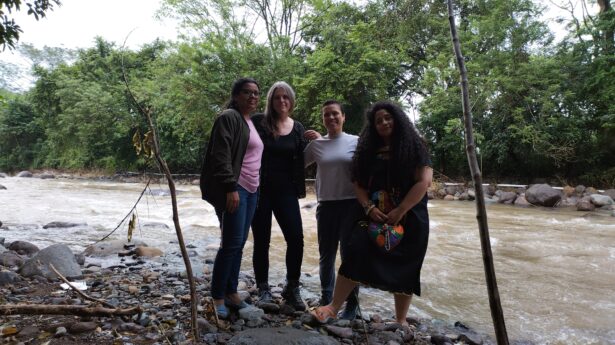The Unitarian Universalist Service Committee advances human rights through grassroots collaborations.
United Nations Condemns Detroit Water Shutoffs

October 30, 2014
Over the past several months, UUSC has been working in Detroit, Mich., to support residents whose human right to water has been violated by mass water shutoffs that began this past spring. In addition to filing legal petitions and mobilizing grassroots action, UUSC recently coordinated with the Michigan Welfare Rights Organization (MWRO), a UUSC partner, to host an October visit from two U.N. officials: Catarina de Albuquerque, the special rapporteur on the human right to water and sanitation, and Leilani Farha, the special rapporteur on adequate housing. The United Nations subsequently released a statement criticizing the shutoffs and laying out a set of recommendations.
As part of the U.N. visit, UUSC ensured that the rapporteurs were able to speak directly with people who have experienced the shutoffs, which have affected more than 27,000 households this year. The rapporteurs said in their statement: “We were deeply disturbed to observe the indignity people have faced and continue to live with in one of the wealthiest countries in the world and in a city that was a symbol of America’s prosperity. We were also distressed to learn from the low-income African American residents of the impossible choices they are being compelled to make — to either pay their rent or their medical bill, or to pay their water bill.”
After detailing the emotional impact of the testimonies they heard, they reiterated U.S. obligations to international human rights law and principles. They also underlined their concerns that not only are the human rights to water, sanitation, and adequate housing not being honored, but also that the shutoffs are disproportionately affecting vulnerable people and low-income African Americans. This contradicts the U.N. Convention on Elimination of Racial Discrimination, which the United States has ratified.
The U.N. special rapporteurs outlined recommendations for the city of Detroit that included the following:
- Restore water connections to residents unable to pay and stop further disconnections
- Adopt a mandatory affordability threshold
- Provide emergency assistance to ensure access to adequate water, sanitation, and housing
- Prioritize the protection of vulnerable groups of people, such as those with disabilities, chronic illnesses, children, etc.
- Assess the public health consequences of the shutoffs and mitigate impact
In addition, the rapporteurs recommended that the federal government immediately investigate the shutoffs for discriminatory impacts on people of color. They also recommended that relevant authorities should require water and sanitation utilities to collect data and report on the demographics of those affected by shutoffs so as to track discriminatory impacts.
International press attention to the visit and recommendations has been widespread, with coverage by Al Jazeera, Fox News, Democracy Now, the BBC, and the Japan Times, among other outlets. The Inter Press Service News Agency ran an op-ed written by Patricia Jones, UUSC’s senior program leader on the human right to water. “Detroit is the tipping point,” Jones wrote, “and the lesson we must learn. Water is the great equaliser. Everyone must have access to survive.”
As the U.N. rapporteurs said in their statement: “Without water, people cannot live a life with dignity — they have no water for drinking, cooking, bathing, flushing toilets and keeping their clothes and houses clean. . . . Denial of access to sufficient quantity of water threatens the rights to adequate housing, life, health, adequate food, integrity of the family. It exacerbates inequalities, stigmatizes people and renders the most vulnerable even more helpless.”
UUSC continues to work on this issue with the MWRO in Detroit and with several partners in other key cities throughout the United States. UUSC has convened a group of expert researchers who are evaluating whether there are formal patterns of discrimination in water provision and documenting the impact on families with children.

